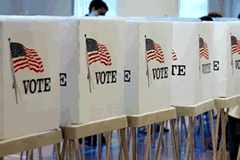“One Person, One Vote”: Arguments Heard in Evenwel v. Abbott - Podcast
Civil Rights Practice Group Podcast
| Sponsors: | Civil Rights Practice Group |
|---|
 At issue in Evenwel v. Abbott, argued on December 8, is whether the three-judge district court correctly held that the “one person, one vote” principle under the Equal Protection Clause allows States to use total population, and does not require States to use voter population, when apportioning state legislative districts. Must each voter’s vote count equally and, if so, how is that to be accomplished? Does the scheme under consideration dilute the votes of certain people and, if so, how are their interests to be balanced against the goal of attaining majority-minority districts? What level of judicial scrutiny will be applied in this case? How does this case differ from Harris v. Arizona Independent Redistricting Commission? Andrew Grossman attended the oral arguments and offered his impressions and predictions on s Courthouse Steps Teleforum conference call. His piece "Evenwel v. Abbott: What Does One Person, One Vote Really Mean?" is valuable background reading on this critical case.
At issue in Evenwel v. Abbott, argued on December 8, is whether the three-judge district court correctly held that the “one person, one vote” principle under the Equal Protection Clause allows States to use total population, and does not require States to use voter population, when apportioning state legislative districts. Must each voter’s vote count equally and, if so, how is that to be accomplished? Does the scheme under consideration dilute the votes of certain people and, if so, how are their interests to be balanced against the goal of attaining majority-minority districts? What level of judicial scrutiny will be applied in this case? How does this case differ from Harris v. Arizona Independent Redistricting Commission? Andrew Grossman attended the oral arguments and offered his impressions and predictions on s Courthouse Steps Teleforum conference call. His piece "Evenwel v. Abbott: What Does One Person, One Vote Really Mean?" is valuable background reading on this critical case.
Featuring:
- Andrew Grossman, Associate, Baker & Hostetler, and Adjunct Scholar, The Cato Institute





